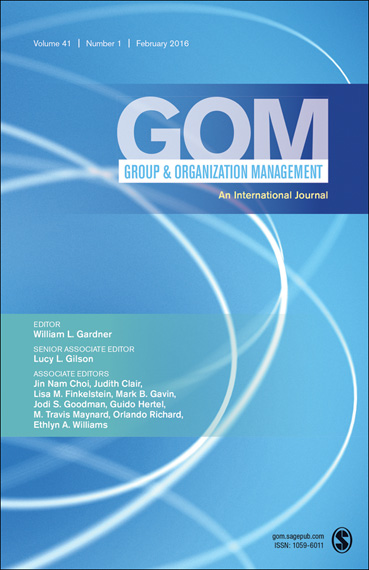Job Satisfaction and Work Climate: New Collections from GOM!
 Group & Organization has added two new article collections to the Editor’s Choice Collections. The new Job Satisfaction collection offers a selection of interesting articles that explore topics like career plateauing, internal job transitions, and the effect of leader humor on job satisfaction.
Group & Organization has added two new article collections to the Editor’s Choice Collections. The new Job Satisfaction collection offers a selection of interesting articles that explore topics like career plateauing, internal job transitions, and the effect of leader humor on job satisfaction.
The new Work Climate collection delves into workplace research, including papers on workplace boredom, personality as a predictor of climate, and the impact of bad behavior in groups. In the article “The Psychological Benefits of Creating an Affirming Climate for Workplace Diversity,” authors Donna Chrobot-Mason and Nicholas P. Aramovich try to identify how workplace diversity can lead to positive outcomes. The abstract from their paper:
Workforce diversity has been described as a double-edged sword; it has the potential for positive and negative outcomes. To better understand why and how diversity leads to positive outcomes, we examined the relationship between employee perceptions of diversity climate perceptions and intent to turnover. We explored the role of four psychological outcome variables (organizational commitment, climate for innovation, psychological empowerment, and identity freedom) as possible mediators of this relationship. Racial and gender subgroup differences were also examined. Survey data were collected from 1,731 public employees. Findings suggest that when employees perceive equal access to opportunities and fair treatment, intent to turn over decreases. Furthermore, these relationships are significantly mediated by psychological outcomes. Implications for diversity management and training are discussed.
 In addition, new articles have been added to Group & Organization Management‘s other collections, including the Editor’s Choice collection on Creativity & Innovation. New articles to this collection explore the impact of job complexity, team culture, and interaction on the creative process. In the article “Defining Creative Ideas: Toward a More Nuanced Approach,” authors Robert C. Litchfield, Lucy L. Gilson, and Paul W. Gilson distinguish types of creative ideas to better understand the creative process. The abstract from their paper:
In addition, new articles have been added to Group & Organization Management‘s other collections, including the Editor’s Choice collection on Creativity & Innovation. New articles to this collection explore the impact of job complexity, team culture, and interaction on the creative process. In the article “Defining Creative Ideas: Toward a More Nuanced Approach,” authors Robert C. Litchfield, Lucy L. Gilson, and Paul W. Gilson distinguish types of creative ideas to better understand the creative process. The abstract from their paper:
Organizational creativity research has focused extensively on distinguishing creativity from routine, non-creative work. In this conceptual article, we examine the less considered issue of variation in the type of creative ideas. Starting from the premise that creativity occurs along a continuum that can range from incremental to radical, we propose that unpacking variation in the mix of novelty and two common conceptions of usefulness—feasibility and value—results in seven meaningfully different types of creativity. We group these types of creativity into four creative continua scaled according to novelty to provide an organizing framework for future research.
To celebrate Group & Organization Management‘s new collections and articles, we have opened all of the articles in the Job Satisfaction, Work Climate, and Creativity & Innovation collections for the next 60 days. Interested in Group & Organization‘s other Editor’s Choice collections? Click here. Want to know all about the latest research from Group & Organization? Click here to sign up for e-alerts!




























































































